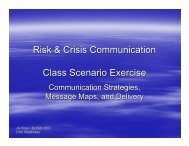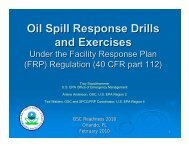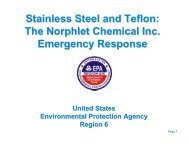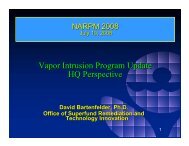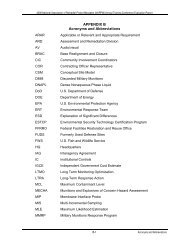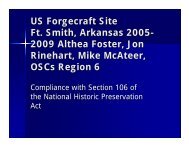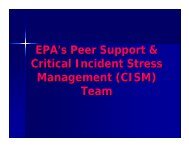OSC 2007 Evaluation Report
OSC 2007 Evaluation Report
OSC 2007 Evaluation Report
You also want an ePaper? Increase the reach of your titles
YUMPU automatically turns print PDFs into web optimized ePapers that Google loves.
<strong>2007</strong> <strong>OSC</strong> Readiness Training Program <strong>Evaluation</strong> <strong>Report</strong><br />
Risk and Crisis Communication<br />
Instructors: Vincent Covello, Center for Risk Communication<br />
Joi Ross, APEX Direct, Inc.<br />
This intermediate course was designed primarily for <strong>OSC</strong>s. The course provided a framework and basic<br />
principles for effectively communicating with local residents and other stakeholders during emergency<br />
response and crisis situations. One of the most difficult tasks an <strong>OSC</strong> must undertake is to clearly<br />
communicate the risk associated with a response. An <strong>OSC</strong>’s audience for risk communication varies<br />
from concerned citizens and elected officials to the news media and business entities, and the type of risk<br />
to be communicated varies across the wide spectrum of responses made by <strong>OSC</strong>s.<br />
Through a combination of slide presentations, videos, and class exercises, participants learned the<br />
principles and rationale behind risk communication techniques, and their importance. Participants also<br />
had the opportunity to examine the critical role of key messages and, through interactive examples, and so<br />
learned how to develop key messages for use in a variety of situations.<br />
The course included response scenario exercises and role-plays when <strong>OSC</strong>s applied the principles of risk<br />
and crisis communication to specific situations. Scenarios were developed specifically for this course and<br />
were based on information from actual projects involving situations that <strong>OSC</strong>s encounter regularly.<br />
Through the scenario exercises and role-plays, participants learned how to effectively prepare for public<br />
interactions and avoid miscommunications and pitfalls.<br />
Participation and Average Grade<br />
Number of Participants Who<br />
Pre-registered<br />
Number of Participants Who<br />
Signed Course Roster<br />
Number of <strong>Evaluation</strong><br />
Forms Submitted<br />
Average<br />
Grade<br />
35 36 26 5*<br />
* The grade displayed is the average of the grades provided on the evaluation forms, where<br />
1 = Poor, 2 = Fair, 3 = Good, 4 = Very Good, and 5 = Excellent.<br />
Summary of <strong>Evaluation</strong> Results<br />
100%<br />
75%<br />
50%<br />
25%<br />
0%<br />
Overall, the presentation<br />
of the course was<br />
appropriate for my level<br />
of experience.<br />
The content of the<br />
course is relevant to my<br />
job responsibilities.<br />
The course had a good<br />
balance of lecture<br />
material, visual aids,<br />
case studies, and<br />
discussion time.<br />
The handout materials<br />
were clear, legible, and<br />
helpful.<br />
The course materials will<br />
be useful as a reference<br />
for my job.<br />
This course should<br />
continue to be offered at<br />
future training programs.<br />
Strongly Agree Agree Disagree Strongly Disagree N/A<br />
C-100 Comments about Individual Training Courses



